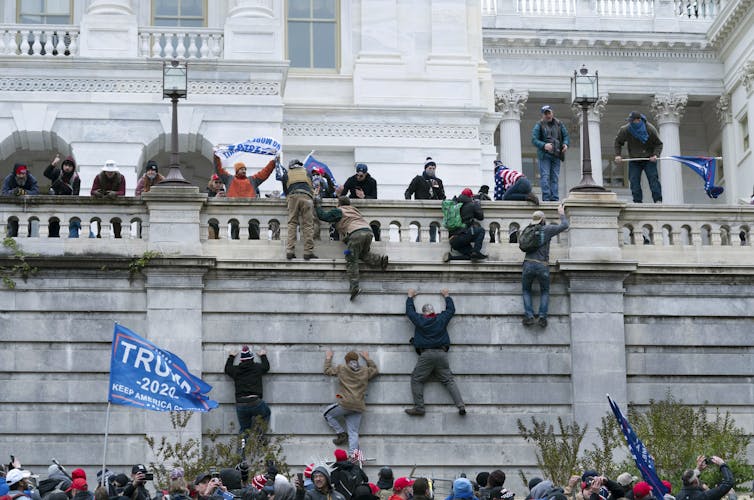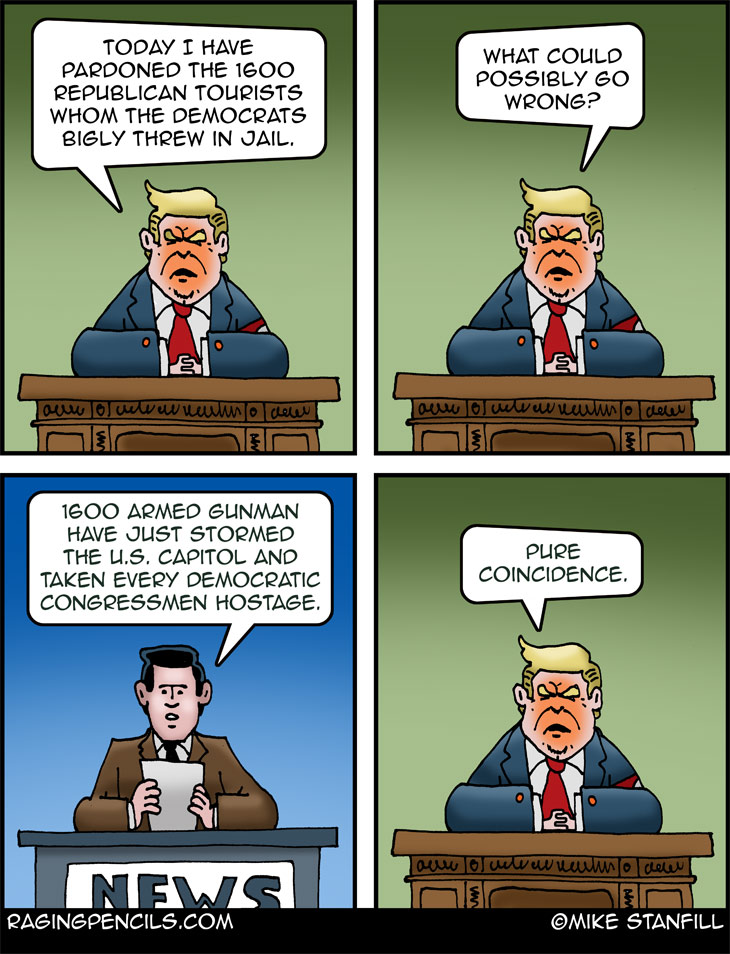Trump’s Jan. 6 clemency ‘flies in the face of the facts’ of violent insurrection, retired federal judge explains
 |
| Rioters scale a wall of the U.S. Capitol building on Jan. 6, 2021. AP Photo/Jose Luis Magana |
In the first hours of his second term, President Donald Trump pardoned nearly everyone convicted of crimes associated with the Jan. 6, 2021, insurrection at the U.S. Capitol – including former Proud Boys leader Enrique Tarrio – and commuted the sentences of 14 more, including Oath Keepers founder Stewart Rhodes.
CNN reported that nearly 1,600 people have been charged and about 1,300 have been convicted of crimes committed on that day. There are about 300 cases “still active and unresolved,” CNN reported.According to a Washington Post analysis, 14 leaders of far-right militant groups Oath Keepers and Proud Boys have been convicted of seditious conspiracy. And 379 people have been charged with felony assault; most of them have been convicted already. though some are still awaiting trial. Trump also ordered the Justice Department to dismiss all pending indictments against Jan. 6 defendants.
To understand the situation, Jeff Inglis, a politics editor at The Conversation U.S., spoke with John E. Jones III, a retired federal judge who was appointed to the bench by President George W. Bush and confirmed unanimously by the Senate in 2002. Jones is now president of Dickinson College.
What’s the difference between a pardon and a commutation?
A pardon essentially wipes away the offense and restores the constitutional rights that a person convicted of a federal felony crime would be deprived of, such as the right to vote and to travel unimpeded. Technically, it does not mean they’re not guilty of the offense, but it washes away all the consequences of the offense.
A pardon can be anticipatory, but in most cases historically it’s given after a person has been convicted of a crime, or at least charged.
A commutation means that, essentially, the president believes the sentence is too harsh or too long. The commutation could either let somebody out of jail immediately and terminate their sentence or could shorten the amount of time remaining for them to serve.
The key difference is that a commutation doesn’t change the fact of a conviction and doesn’t wash away the consequences.
What do judges think about a president exercising the power to pardon and commute?
There have been instances historically where judges probably have agreed with commutations and pardons. It’s typically not ever top of mind when you sentence people that someone is going to commute that sentence or pardon. It’s a pretty rare occurrence.
I will say that in my experience, if someone was angling for a commutation or pardon without any sense of gratitude or remorse, that would be more difficult to swallow for the judge who passed the sentence.
What do judges think about Trump’s actions in these Jan. 6 cases?
In many cases, these judges sentenced the offenders to less than what the government was asking for. They gave them a break and went below the advisory sentencing guidelines that judges have to consult when they pass sentence. They’re not mandatory, but judges have to explain why they’ve sentenced outside the guidelines when they pass sentences. The Department of Justice wanted sentences at the upper end of the guidelines because of the conduct of the individuals.
When it comes to Jan. 6 offenders, not only do I think they received appropriate due process, but in some cases, I believe they received excessive due process.
For example, look at the case of a person from Pennsylvania named Joseph W. Fischer. Fischer is a former police officer, and he was charged, among other things, with obstructing the business of Congress by damaging or destroying items. He argued that his actions did not meet the criteria of obstructing Congress and took his case all the way to the Supreme Court, which sided with Fischer. He had access to the courts. He had good lawyers. He took the case all the way up and was able to rid himself of that particular charge.
I think the judges were fully capable and did, in fact, sentence according to the degree of conduct of the offenders.
You’re a retired federal judge. How does this action of pardoning and commutation of this group of people make you think about the justice system?
Two of the purposes of sentencing are deterrence and respect for the law.
Taking deterrence first, imagine you are an individual who believes that taking the law into your own hands and attempting to interfere with the business of government is the right way to proceed when you disagree with the result. The message that blanket pardons or commutations sends is essentially: You can get away with those actions without penalty, because your benefactor is going to save you in the end.
Respect for the law is another aspect. What I’m hearing from a number of incarcerated folks who say they expect to be pardoned or have their sentences commuted is that they don’t believe they’ve done anything wrong. Might those same individuals engage in similar behavior at another time, thinking that they can do that with impunity?
I think Trump is going to make these people into martyrs and heroes, and to my mind, that flies in the face of the facts of these cases.
How do you think about Trump’s Jan. 6 pardons and commutations alongside the pardons and commutations that former President Joe Biden issued on the way out the door?
It’s really troublesome. Setting aside my judicial career and history and career in the law, the fact of the matter is, the general public just sees dozens and dozens, if not hundreds, of pardons.
It is probably true that we’re seeing an overuse of the pardon power at this point, maybe more than we’ve ever seen in history.
I think Biden pardoning his family members was bad for him. If you’re going to do it, do it in the light of day. There’s still a bad taste in many people’s mouths about Hunter Biden’s pardon.
I see the point: He’s taking Trump’s threats of retribution seriously. The Justice Department could convene grand juries and investigate folks, and whether they were bona fide charges or not, it would cost them millions of dollars in legal fees. In the case of Hunter Biden, I guess any parent has empathy. It’s his son, and he had the power to do it. It’s sort of a tortured situation.
But then I think about all of us on Jan. 6, 2021, turning on the TV and seeing something that we’ve never seen before in history. It is rare that something happens for the first time in history, and that searing image is stuck in a lot of folks’ brains.
I think you absolutely can logically and factually differentiate them. But I don’t know if that’s what’s going to happen in the court of public opinion.![]()
John E. Jones III, President, Dickinson College
This article is republished from The Conversation under a Creative Commons license. Read the original article.
